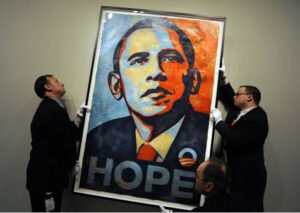Patrick Courrielche, film maker and all-aound art macher, is something of a gadfly in the “art community.”. On August 25th, he posted an account of his participation in an invitation-only conference call enlisting artists to play the missionary for Obama’s policy agendas on” heath care, energy and environment, safety and security, education, community renewal.” The call was sponsored by the National Endowment for the Arts, the White House Office of Public Engagement, and United We Serve. (That last is a spanking new iniative of the White House, kicked off by Michelle Obama on June 22nd.
We were encouraged to create art and art initiatives that brought awareness to these issues. Throughout the conversation, we were reminded of our ability as artists and art professionals to “shape the lives” of those around us. The now famous Obama “Hope” poster, created by artist Shepard Fairey and promoted by many of those on the phone call, and will.
i.am’s “Yes We Can” song and music video were presented as shining examples of our group’s clear role in the election.
Courrielche went public because he thought the NEA existed for the arts, not the arts for the state. He was not amused that the White House considered the arts an arm of the state. And with good reason. Art for the party’s sake is an old idea. Half a century ago Nikita Khruschev put it this way: “Art belongs to the sphere of ideology.” Art should “arise high civic feelings” and encourage resolve to devote oneself “to the struggle for the people’s happiness.”

Leonid Ilyichev, Khruschev’s spokesman for the arts, was charged with promoting solidarity in the arts “on the basis of service to the noble cause of building communities communism.”
For anyone too young to remember those noble efforts at unleashing “the transforming revolutionary activity of the masses”, look up Priscilla Johnson’s Khrushchev and the Arts: the Politics of Soviet Culture, 1962-1964. (MIT Press, 1965).
Meantime, consider requesting a name change for the NEA. How about Ideological Commission of the Central Committee?
or maybe Department of Agitation and Propaganda? Both were agencies headed by Ilyichev. Both existed to promote the party spirit in the arts.
© 2009 Maureen Mullarkey


